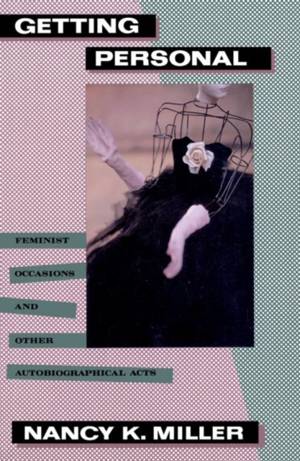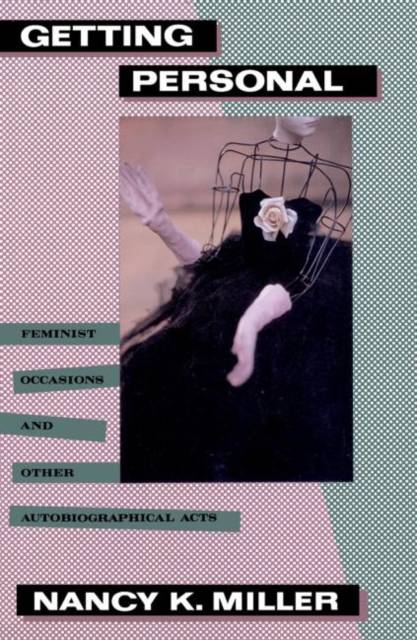
Bedankt voor het vertrouwen het afgelopen jaar! Om jou te bedanken bieden we GRATIS verzending (in België) aan op alles gedurende de hele maand januari.
- Afhalen na 1 uur in een winkel met voorraad
- In januari gratis thuislevering in België
- Ruim aanbod met 7 miljoen producten
Bedankt voor het vertrouwen het afgelopen jaar! Om jou te bedanken bieden we GRATIS verzending (in België) aan op alles gedurende de hele maand januari.
- Afhalen na 1 uur in een winkel met voorraad
- In januari gratis thuislevering in België
- Ruim aanbod met 7 miljoen producten
Zoeken
Getting Personal
Feminist Occasions and Other Autobiographical Acts
Nancy K Miller
Paperback | Engels
€ 83,95
+ 167 punten
Omschrijving
In the era of identity politics, whose is the I of cultural criticism? And what does the invention of an autobiographical persona have to do with contemporary theory? In Getting Personal, Nancy K. Miller reflects upon the ways in which contingencies of identity and location shape the writing of academic argument and the living of an academic life.
Getting Personal explores the new territory of feminist cultural studies and its connections to literary interpretation. The book is organized around a number of academic scenes in which Miller analyses the stakes of feminist critical performance. The focus on occasions, from the conference to the seminar to the professional colloquium, produces an autobiographical perspective on the mini-drama of institutional politics - whether faculty struggles over the canon in elite universities, or student strivings for self-authorization in large urban ones. Writing as a feminist critic, Miller describes the dilemmas of a responsible pedogogic practice: the contradictory demands of authority and complicity for a feminist teacher of literature.
Getting Personal examines the rhetorical strategies of a feminism traversed by internal debates over its own self-representations. Working through and among quotations of voices that might otherwise not address each other, Miller assesses a crisis and offers a project for moving on.
Getting Personal explores the new territory of feminist cultural studies and its connections to literary interpretation. The book is organized around a number of academic scenes in which Miller analyses the stakes of feminist critical performance. The focus on occasions, from the conference to the seminar to the professional colloquium, produces an autobiographical perspective on the mini-drama of institutional politics - whether faculty struggles over the canon in elite universities, or student strivings for self-authorization in large urban ones. Writing as a feminist critic, Miller describes the dilemmas of a responsible pedogogic practice: the contradictory demands of authority and complicity for a feminist teacher of literature.
Getting Personal examines the rhetorical strategies of a feminism traversed by internal debates over its own self-representations. Working through and among quotations of voices that might otherwise not address each other, Miller assesses a crisis and offers a project for moving on.
Specificaties
Betrokkenen
- Auteur(s):
- Uitgeverij:
Inhoud
- Aantal bladzijden:
- 184
- Taal:
- Engels
Eigenschappen
- Productcode (EAN):
- 9780415903240
- Verschijningsdatum:
- 15/07/1991
- Uitvoering:
- Paperback
- Formaat:
- Trade paperback (VS)
- Afmetingen:
- 153 mm x 229 mm
- Gewicht:
- 299 g

Alleen bij Standaard Boekhandel
+ 167 punten op je klantenkaart van Standaard Boekhandel
Beoordelingen
We publiceren alleen reviews die voldoen aan de voorwaarden voor reviews. Bekijk onze voorwaarden voor reviews.









